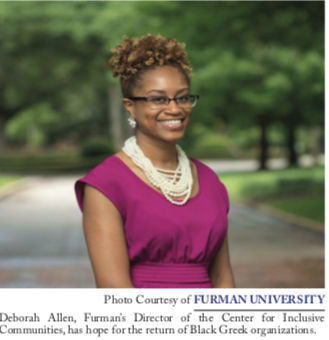This September, the Center for Inclusive Communities hosted a meet and greet with local National Pan Hellenic Council graduate charters. This event was held as a part of the efforts to increase the presence of historically Black Greek letter organizations on campus. In the weeks leading up to the event, prospective students were reminded and encouraged to attend as it was important to showcase our community and demonstrate to representatives that Furman is a place where NPHC organizations can thrive. At the event, students were given the opportunity to approach each chapter in attendance, ask questions, and receive information about each chapter.
The event created increased interest among students and a desire to have more of Black Greek letter organizations on Furman’s campus. However, the event also begged the question of why Furman only has one active chapter on campus and what can be done to get other chapters started. Deborah Allen, Director of the Center for Inclusive Communities, provided insight into this important question, suggesting that “there’s always been an interest in NPHC organizations on campus. Allen also noted that “Alpha Kappa Alpha is currently active on campus, and the University is in discussion with Delta Sigma Theta, Phi Beta Sigma, and Kappa Alpha Psi.”.
Moreover, Furman has a history of NPHC organizations on campus. Allen indicated that Furman has had chapters of “Kappa Alpha Psi, Omega Psi Phi and still hold an Alpha Kappa Alpha charter.” That said, Allen also recognized the challenge of keeping NPHC organizations on campus, saying that “because NPHC organizations are traditionally smaller, it can be a challenge to sustain these groups, particularly on smaller campuses.” Nonetheless, Allen also noted the importance of revitalizing Furman’s NPHC community, saying “Furman loses out on prospective students because we currently do not have a thriving (NPHC) community. This then makes it a challenge to expand the community due to a lack of critical mass.”
Moving forward, Allen does believe there is hope for a future NPHC community at Furman because of the continued student interest. According to Allen, it is this interest that will continue to work to justify and elevate the necessity for these organizations as a whole. Furman first years, Brianca Beckford and Nagiah Ferrell represent some of the students that are motivated to bring Black Greek letter organizations to campus.
Beckford, for example, said “I am interested in Black Greek life due to the atmosphere it creates and the way it brings diversity together through dance, chants, community service, etc.” She also noted that “it’s very important to me not only historically but because it is something that is seen throughout my family and close family friends and I want to be a part of that too.” Ferrell answered similarly stating, “I am interested in black Greek life because I want to be a part of something bigger in an organization that has a legacy of being known for a scholarship in service.”
With respect to their thoughts on what it might take to succesfully bring Black Greek life back to campus, Beckford called for action from Furman’s administration, saying “I think it takes not only the students’ interest but also backing from administration and other Furman “high-ups” Moreover, she hopes that the enitre Furman community (not just the students of color) will “push for black greek life just as well as they push for inclusivity as a whole, it will make it easier for these chapters to come to this campus.”
In conclusion, Beckford—like Allen—is hopeful and believes that “in time... the chapters will thrive if the demand for them is there.”
